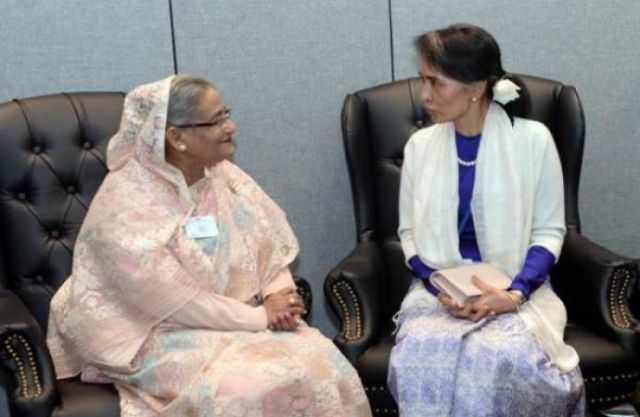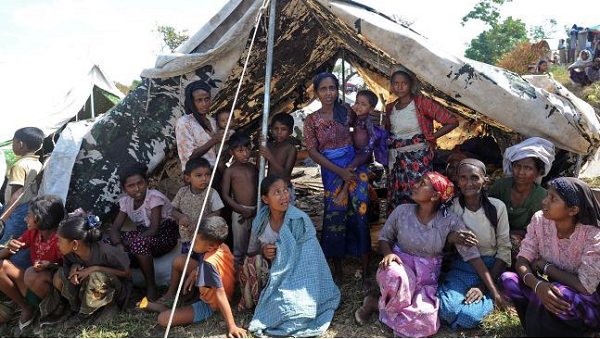
by admin | May 25, 2021 | World

Aung San Suu Kyi
London : An Oxford college where Myanmar’s de-facto leader Aung San Suu Kyi studied as an undergraduate has removed her portrait from public display, in a move that follows global criticism over her role in her countrys humanitarian crisis.
The governing body of St Hugh’s college, one of the University of Oxford’s constituent colleges, decided to remove the painting of the Nobel laureate from its main entrance on Thursday, days before the start of the university term and the arrival of new students, the Guardian reported late on Friday.
In 2012, Suu Kyi was celebrated with an honorary doctorate from Oxford University, and held her 67th birthday party at the college where she studied politics, philosophy and economics between 1964 and 1967.
In a statement St Hugh’s said: “The college received the gift of a new painting earlier this month which will be exhibited for a period. The painting of Aung San Suu Kyi has, meanwhile, been moved to storage.”
St Hugh’s student newsletter, The Swan, said the decision to remove the portrait was taken by the college’s governing body, which includes its fellows and principal Elish Angiolini.
The portrait, painted by the artist Chen Yanning in 1997, belonged to Suu Kyi’s husband, the Oxford academic Michael Aris, reports the Guardian.
After Aris’s death in 1999 the portrait was bequeathed to St Hugh’s, and hung near the college’s main entrance on St Margaret’s Road in north Oxford.
The Oxford council will vote next week on stripping Suu Kyi of the freedom of the city it bestowed on her in 1997, when she was being held as a political prisoner by Myanmar’s military junta.
So far Oxford University has decided not to reconsider Suu Kyi’s honorary degree. But last week the university expressed its “profound concern” over the treatment of the Rohingya, a Muslim ethnic minority.
Over 500,000 Rohingya Muslims have fled to Bangladesh after the ongoing spate of violence began on August 25 when Rohingya rebels attacked police checkposts in Rakhine state and killed 12 security personnel.
—IANS

by admin | May 25, 2021 | Opinions

Sheikh Hasina and Aung San Suu Kyi
By Subir Bhaumik,
Sheikh Hasina and Aung San Suu Kyi have much in common. They are daughters of great fathers who spearheaded the freedom struggles of their countries (and both lost their fathers early). Both fought bitter, protracted struggles against brutal military juntas to restore democracy in their countries. Both now run their countries but live under threat of conspiracies to unseat them, trying to control their powerful militaries and rising religious fundamentalist forces, often backed by men in uniform.
But they differ in some ways.
Suu Kyi married a British professor after her initial education in India where her mother served as ambassador of Burma (before it became Myanmar). Her style is sometimes more British than Burmese due to her Oxbridge education. Despite her long years in prison and successful leadership of the National League for Democracy (NLD) in sweeping the 2015 elections and coming to power, some say she is still coming to terms with the realities of a country ravaged by conflict and poverty. She is the daughter of Aung San, the independence war hero who tried to forge a stable federation with Myanmar’s diverse people but was murdered, like Mahatma Gandhi, just when the country was attaining freedom.
Hasina survived the assassination of almost her entire family, spent some years in India before she returned to revitalise her father’s Awami League party and bring down the military junta in a fierce street agitation. She led it to power for a term in 1996 and then again in 2008. After two terms in power and 11 assassination attempts, Hasina is a strong grassroots leader with a clear vision to make Bangladesh a middle-income country by 2021 and a developed economy by 2041. Once derided as a “basket case”, Bangladesh has seen a steady 6 per cent plus GDP growth through her two terms in office (2009-14 and 2014 to now) in a world marked by economic downturn.
She has managed to control the army and enforce civilian supremacy, which Suu Kyi aspires to but has so far failed to do, as the recent Rakhine crisis seems to indicate. Hasina faces Parliament elections next year amid increased anti-incumbency and a refugee crisis that is stretching Bangladesh’s meagre resources. Hasina’s government has managed to handle nearly half a million Rohingyas who have taken refuge in Bangladesh after the brutal Burmese military crackdown that followed alleged jihadi attacks on August 24 against 30 police stations and one army base in northern Rakhine.
As Suu Kyi, a Nobel Laureate for her fight for democracy, stayed away from the UN General Assembly in the face of severe criticism, with some even suggesting that her Nobel Prize be taken back, Hasina has been striding the global stage confidently, winning nomination for the Nobel for her leadership in the fight against climate change and terrorism and all-round human development in her once-poor nation ravaged by frequent natural disasters.
Suu Kyi could emulate Hasina in at least three areas — unleashing powerful forces of human and economic development, controlling the military and terrorist groups who often complement each other, and restoring a sense of national pride by resolving fractious domestic issues.
Both “Daughters of the East” represent the legacy of their great fathers and on their governance success and depth of vision depend the future of Asia’s most strategic link region that connects South to Southeast and East Asia. It is time the two big Asian powers, India and China, step in to back both these women in their governance challenges against violent separatism, religious fundamentalism, poverty and refugee crisis.
(Subir Bhaumik can be reached at sbhaum@gmail.com)
—IANS

by admin | May 25, 2021 | Muslim World
Addis Ababa (IINA) – Special Advisor to the UN Secretary General on the Prevention of Genocide Adama Dieng on Tuesday accused Myanmar’s government of allowing discrimination to continue against the country’s Rohingya Muslim community and warned that it could lead to genocide.
“It was our hope that the new administration in Myanmar will address the issue of discrimination against the Rohingya who are Muslims. Instead, they have continued to be denied their identity,” Dieng told German Press Agency (DPA) in the Ethiopian capital of Addis Ababa, where he was attending a UN-sponsored meeting on the role of African religious leaders in preventing violence and extremism. “If it is not halted, it could lead to a genocide,” he added.
The Rohingya are a minority Muslim group in predominantly Buddhist Myanmar. The government does not consider them to be a native ethnic group but illegal Bengali immigrants, stripping them of their citizenship and property.
Dieng urged Myanmar’s State Counsellor Aung San Suu Kyi to use her moral authority to prevent discrimination against the Rohingya.
“Suu Kyi has asked the new US ambassador in Myanmar not to use the [name] Rohingya. This means the discrimination that this minority group faced for so many decades has continued,” he said.
Although Suu Kyi has been hailed for her pro-democracy activism in the past, she has recently come under criticism over the situation of the Rohingya, whose population exceeds one million.



